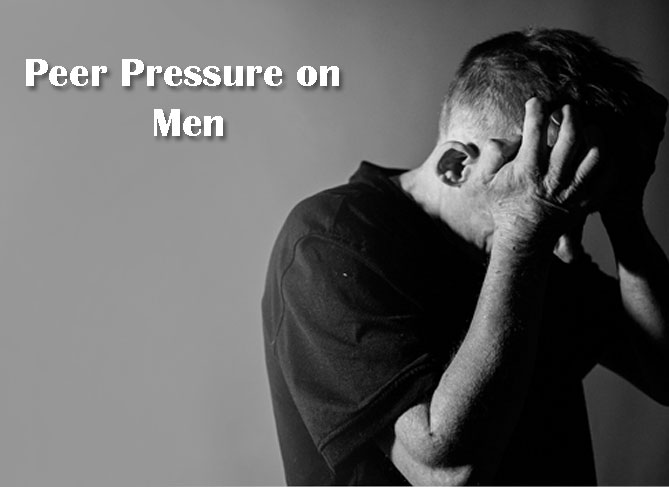
Peer pressure is a form of social pressure where a person’s psyche, behaviour, values, attitude and actions are influenced by his/her peers to conform to that of a group he/she belongs to. One of the most common examples you can relate to is listening to a particular type of music, simply because the group of friends/peers listen to that music. This phenomenon has been found to take place in a broader context, particular society, religion, language, and political belief, among others.
Every demographic group has its peer pressure, to make most people in that group conform to the usual norms. The most common peer pressures are focused on women. You will usually find traditional terms that create certain expectations from a woman, such as to be an ideal mother, maintain a perfect body, and many more. However, men are usually ignored; let’s examine the societal and peer pressure on men.
Conundrum for Men
What we usually miss in our analysis is the rigid construct that society creates for men to become a ‘real man’. The pressure of becoming the real man or a perfect family person, juggling a fruitful career/an unrealistic body shape, makes many men feel trapped. This covert peer pressure has led to increased incidence of eating disorders, depression, anxiety, and stress among men.
As per a recent study carried out in the US, UK and Mexico, the subjects reported that men feel pressurized for living in the “man box” to conform to societal expectations. Some of the common expectations society has from men include acting tough even in cases of vulnerability (such as not crying even when one wants to), hiding weaknesses, looking good, and many more. The study report points out that the peer pressure on men (for acting or behaving in a particular manner) adversely affects their health, well being, and relationships with other men/women/children.
What are the Common Peer Pressures on Men?
Most men get stressed about becoming the quintessential ‘perfect man’. This pressure (inherently Victorian) is taught to them by family members, friends, elders, and other constituents of society. The peer pressure to become the perfect man is more stressful than office pressure or the inability to maintain a work-life balance.
In the modern world, a man gets stressed out by peer pressure in the following ways:
-
Conform to masculine stereotypes
Masculine stereotype culture expects a man to be on testosterone overdose. The fad of having beefy muscles and 6-pack abs are only a few glaring examples of the masculinity culture. Some other examples include beer-swilling, ‘lad culture’, football-mad culture, gym culture, and many more. Also, men are portrayed as inherent risk-takers, who are seemingly not afraid of the consequences.
-
Become a good father
A perfect father is expected to be a family man who will do the following:
- Take kids to school
- Take kids to sports or extracurricular activities
- Help with studies
- Put the kids to bed
-
To be the provider of the family
Traditional families expect the wife to stay at home and look after the family, while the husband goes out to earn money. In the modern world, wives are also working in regular jobs. However, in most cases, the traditional family’s basic idea has remained more or less the same. The pressure remains on the man in the family to be the primary provider.
-
Have a successful career
A man is entrusted with the responsibility of being the primary breadwinner, continuously judged for the success achieved in career. It doesn’t stop at that, position he has achieved in profession, and how much material possession he has accumulated is a constant too.
- Does the person have a house?
- Does he wear branded clothes/ footwear?
- Does he possess a car? If yes, what brand?
Becoming successful within a short time is the leading peer pressure men have to confront regularly.
-
Have ‘tall, dark, handsome’ looks
Looking good is not a pressure on women only. It has now spread among the urban youth and men too. That’s why there has been tremendous growth in male grooming products. An arbitrary standard of beauty has been popularized by the film stars, through advertisements on television and online. ‘Kya pata spotlight kab aap par aa jaye,’ says a popular commercial. To make sure one looks handsome, one goes the extra mile and works hard on cultivating a well-chiselled body and ‘spotless’ face. All these aspects, when combined, have an adverse effect on the mental health of men.
Conclusion
A study has found out that 40% of men feel ashamed to talk about depression and other mental health conditions, until they come with the thoughts of self-harm or suicide. Men’s mental health and physical health are paramount, Men’s Health Awareness Week (June 10-16 – the week preceding and including Father’s Day) is being observed since 2002 across the world.
The idea is to highlight the problems surrounding men’s health and well being, encourage discussion on the issues, and work together towards a solution. To maintain balance in society, it has become imperative to break down the gender stereotypes, teach society to be less judgmental, and discuss mental health issues more openly. A continuous effort will ease peer pressure on men, bring down their stress level, and ultimately improve their mental health and overall well being.




